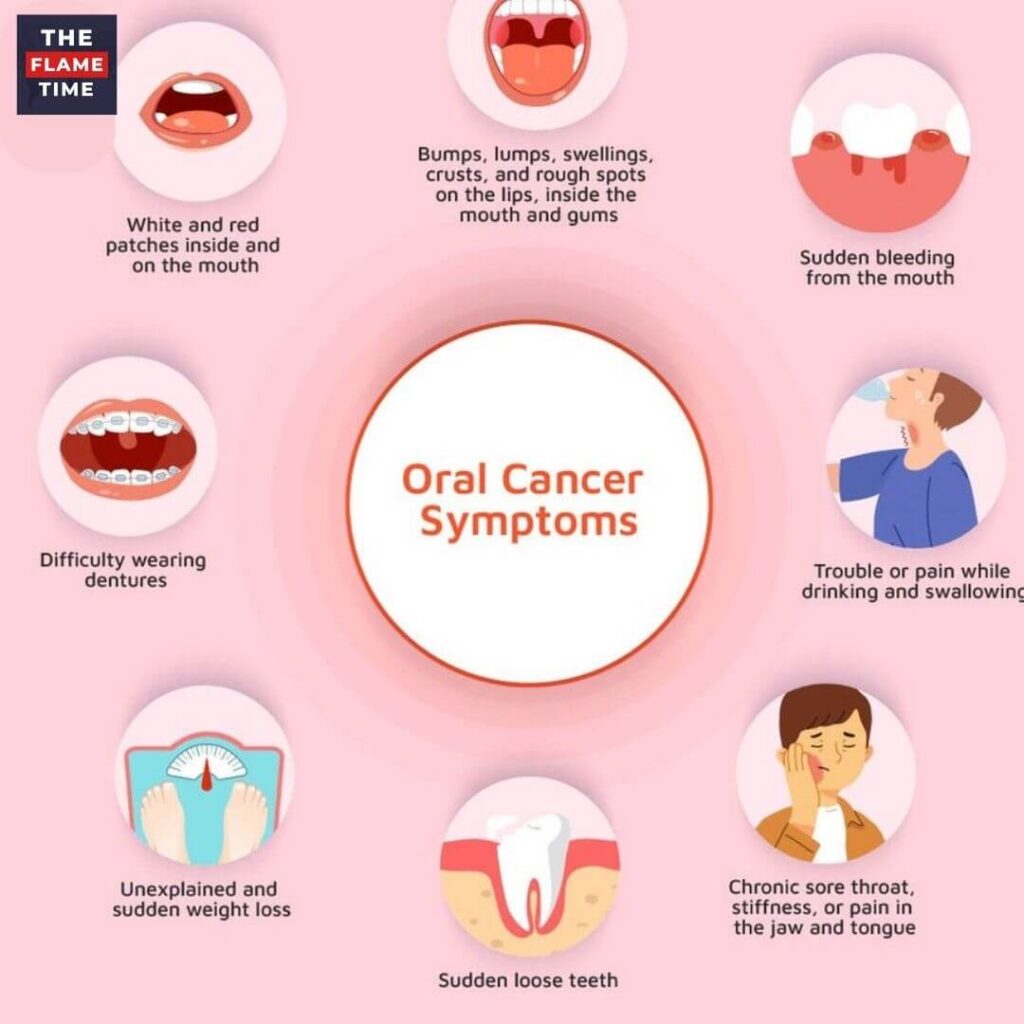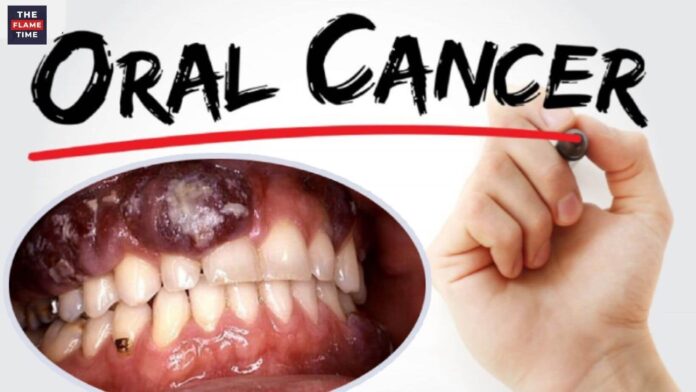Cancer symptom: The condition in the mouth is Known as Mouth Cancer (Oral Cancer) Cancer can occur in any whare of the body. In cancer cells grow abnormally and uncontrollably. In this way, uncontrolled but abnormal cell filling can infiltrate any part of the body and destroy it.
Cancer is a disease that is the second largest cause of death in the world, but there are some cancers that can be cured by screening, treatment, and prevention.
Cancers Occurring in The Mouth
Oral cancer in the mouth is called oral cancer, which occurs in the mouth and throat tissue. It is a type of head and neck cancer, which is a large group of cancer.
Mouth cancer includes cleft palate, soft palate, sinuses, and throat cancer, which can be fatal if not diagnosed and treated on time.
Oral cancer is a very easily treatable condition if detected early. Oral cancer is more or twice as common in men than in women. Men over the age of 50 may also be at the highest risk. Smoking and tobacco use are the leading causes of oral cancer.
Symptoms and Signs Of Oral Cancer
If abnormal changes in the mouth and the blisters are not getting cured even after the treatment, then the doctor should be consulted because the doctor can identify and tell whether it is the initial symptom of oral cancer or not.
Oral Cancer Symptoms

- Ulcers that do not heal – Ulcers in the mouth that do not heal can also be symptoms of oral cancer.
- Non-healing of wounds – Wounds on the face and neck that do not heal within 2 weeks can also be signs of cancer.
- Mouth Pain – Pain in the mouth that is not getting better is the most common symptom of oral cancer.
- Weight Loss – Causes Too much weight loss can be a sign of cancer
- Mouth patch – Velvety white red patchy patch in the mouth
- uneven changes in the mouth – hot gums, swollen areas inside the mouth, crusting or erosion developing
- Bleeding – Bleeding in the mouth for no reason
- There is pain or numbness – numbness in any area of the face, mouth, neck, or ear without any reason, no feeling or pain, tenderness
- Difficulty in chewing, speaking, swallowing, or moving the jaw awkwardly
- Hoarseness and change in voice Lump in neck
Causes of mouth cancer
Oral cancer occurs when mutations begin to mimic the DNA of cells in the mouth. The mutations cause cells to grow and divide abnormally and the accumulation of normal cells leads to the formation of a tumor causing cancer.
Cancer Symptom: The Condition in The Mouth is Known As Mouth Cancer
Causes that can Cell Mutation but Doctors Identify Factors That Increase Oral Cancer:-
- Cigarette, cigar, pipe, gutka, and any tobacco use
- Drinking Alcohol
- Excessive sun exposure on the lips
- Weakened immune system
- A sexually transmitted virus called human papillomavirus (HPV) can be
Oral Cancer Prevention
Some of the ways to avoid oral cancer are as follows:-
- Do not use cigarette bidi or any tobacco product
- eat a good and balanced diet
- Use UV-blocking sunscreen on your skin and lips whenever children go out in the sun as much as possible
- Young people who engage in oral sex have a higher risk of spot cancer
Do a self-examination of your mouth by standing in front of a bright light in the mirror and trying to feel your mouth parts if there are any lumps or nodes. If you feel it can be the symptoms of cancer, consult a doctor immediately.
- Have regular checkups with your dentist
- Early detection of oral cancer increases the chances of a cure.
Oral Cancer Test
Tests and procedures for the diagnosis of oral cancer
- Physical examination The dentist will take a photo of the mouth to look for abnormalities such as areas of irritation, white spots
- Biopsy If any suspicious area is found, then the doctor takes out a sample of cells and recommends a biopsy.
- Other tests If the biopsy confirms that you have oral cancer, further tests will need to be done to find out the stage of cancer before starting treatment. These tests usually go ahead with the primary cells.
It consists of the following
- x-ray
- ultrasound scan
- MRI scan
- CT scan
- PET scan
Treatment of Oral Cancer
The treatment of oral cancer only depends on the exact location and stage of the cancer. Treatment options include surgery, radiation, and chemotherapy. Sometimes more than one of these options may be needed for treatment. This doctor will tell you which ones are right for you and would be appropriate.
Different types of surgery can be done for oral cancer
- In surgery to remove the tumor, the surgeon removes the cancer and some of its surrounding tissue, making sure that all cancer cells are removed. Only small cancers can be removed through minor surgery. big need lots of people.
- Surgery to remove cancer that has spread to the neck If cancer cells have spread or are at risk of becoming so, your surgeon may recommend a limited and nonsurgical removal of cancer depending on the size of your cancer and kills types of cancer cells.
- Surgery to reconstruct the mouth After surgery to remove cancer, surgeons recommend surgery to reconstruct the mouth to help you regain your ability to speak and eat.
Radiation Therapy
Radiation therapy may be needed in the early stages of cancer. Radiation therapy is also used after surgery. In other cases, both radiation therapy and chemotherapy are given together. This increases the effectiveness of radiation therapy but also increases its side effects. In the case of advanced oral cancer, radiation therapy can help relieve symptoms such as pain.
Chemotherapy
Uses chemicals to kill cancer cells The same drugs may be needed May increase the effectiveness so both are often given.
Other treatments
Targeted Drug Therapy
Targeted drugs treat oral cancer by causing changes in cancer cells. Cetuximab is a targeted therapy used to treat certain types of head and neck cancer. It blocks the action of a protein found in many types of healthy cells. but is also found in some types of cancer cells.
Oral cancer types
Oral Cancer includes The Following Cancers
- Lip cancer
- tongue cancer
- cheek cancer
- gum cancer
- the floor of mouth cancer
- Cancer of hard and soft palate
Read More:- Top-10 Fitness Tips for Lose Weight Fast
Oral Cancer Types
- squamous cell – carcinoma and more than 90 percent of cancers found in formalin are squamous cell carcinoma stem cell carcinoma means few cancer cells and normal
- Varicose carcinoma- Approximate age of main tumor 1-year Tumor is a verrucous carcinoma Very slow growing cancer made up of cancerous cells
- Minor salivary gland carcinoma – This cancer can develop on the small salivary glands that are found at the level of the mouth and throat.
- Lymphoma Cancer – What develops in the tissue that is part of the immune system is called lymphoma and lymphoid tissue occurs in the tonsils and base of the jaw.
- Leukoplakia and Erithroplakia – This non-cancerous condition means there are certain types of abnormal cells in the mouth or throat. It is flat and slightly raised and often bleeds when scratched. Can be a type of cancer that can be diagnosed by biopsy and other tests.
Stage and Grade of oral cancer
Different methods of the same score are used to classify the stages of different types of cancer–
- Stage 0 cancer is where it started and has not spread
- Stage 1 cancer is also small and has not spread anywhere.
- Stage 2 cancer has grown but the verdict is not there
- Stage 3 There has grown and may have spread to surrounding tissue and lymph nodes.
- Stage 4: How it has spread from where it started to at least one other body part. This is also known as secondary metastatic cancer.
Grade of Oral Cancer
Cancer status of cancer cells can be determined-
The low grade indicates slow-growing cancer and the high grade 1 indicates fast-growing cancer. The commonly used grading system is as follows.
- Grade 1 – cancer cells that look like normal cells are growing rapidly.
- Grade 2 – Cancer cells do not look like they are growing faster than normal cells.
- Grade 3 – cancer cells that look abnormal are growing more.
Note:- If there is any problem with the rest of your body, then you must consult your doctor beforehand.

